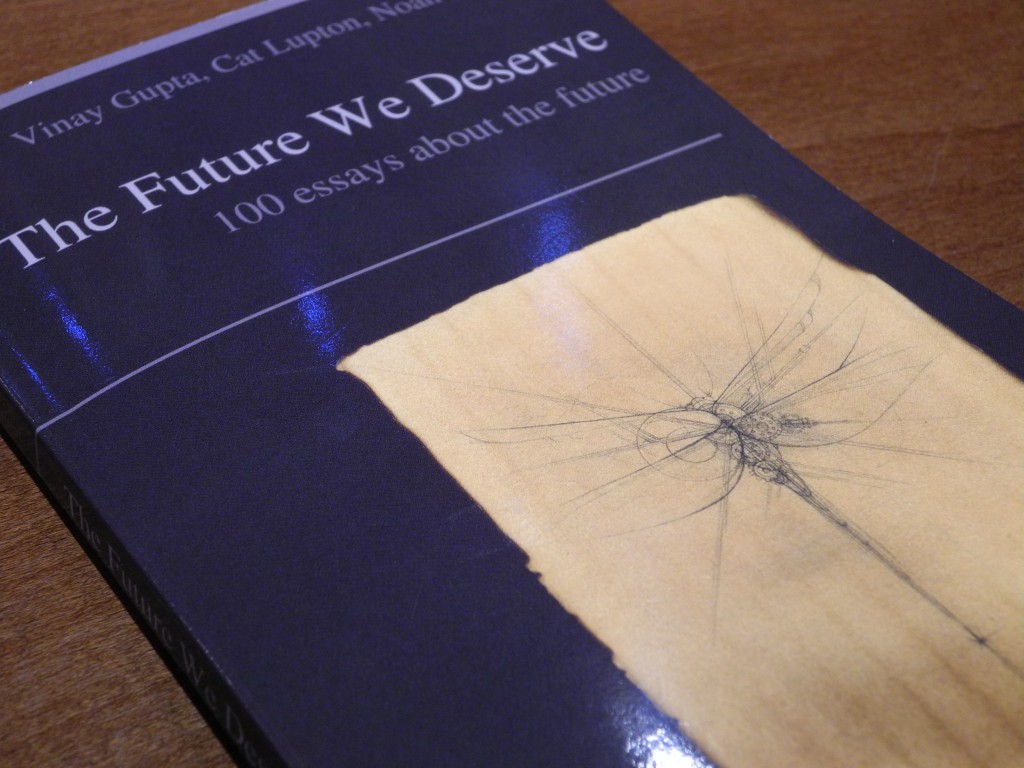The Future We Deserve – an exercise in hope
by Vinay Gupta • March 9, 2012 • Everything Else • 4 Comments
So… it’s done. The Future We Deserve, my – well, our book project, is done. You can buy a lovely copy online from PediaPress and it’ll be on Amazon soon enough. It’s a thing of beauty, if I do say so myself.
So what can I tell you? As you know, a hundred people wrote for the book. I wrote a couple of pieces, one or two other people wrote a couple of pieces, but it’s basically a hundred different perspectives. It’s shocking, jarring, powerful stuff. The common experience is that it’s so dense (the pieces are a page each, more or less) and the ideas so packed that after reading a couple of pieces you need to put it down and do something else while it assimilates. I feel like we might wait most of a year before decent reviews come out because it takes that long to assimilate it.
I waited. This is the hard part to explain. We had most of the material in place a year ago, and I had some grand ambitions. They were twofold. Firstly, I wanted to write a long sense-making introductory essay picking out common threads and deep ideas, spinning a coherent narrative from the pieces people had given us. Secondly, I wanted to run some workshops on the book, using the ideas in it as starting points for conventional futurism.
I failed in both of these, and that’s why you should read the book. Here’s the lesson: when you actually talk to people in depth about what they want in life, it’s not possible to approximate a useful truth from it. You blur it, you build categories, you can pretend the pieces join.
But when you read the source data, the world stops for a while. The experience is gazing at the world through a hundred different lenses, peering into hopes and fears, closely held, tightly expressed, beautifully composed in many cases, and slowly dawns the insight.
We have no idea where we are going or what is going on.
There’s the stuff we know about global warming and population and resource scarcity, that part of the future we understand. But there is a human factor beyond all that, something within us that you have to ask the right questions to see. I did not know, when I said “the future we deserve” that I’d hit on a key which empowered people to get in touch with their deepest hopes (and fears) for humanity and the world, and speak with authority for themselves and our race.
This book has soul.
It’s free. Please read it and pass it on.
And now a note about our authors. Thank you so much for writing such amazing things. I’m contacting people slowly, sort of relishing the opportunities to say “hey, it’s done!” and touch base, see how life has been. It’s been really good working with you. Together we’ve built something amazing, something that really touches people. These are your words, not mine! There will be a directory with short bios, twitter handles and so on soon. Please give us a chance to sort out the wiki namespace issues first, though!
I’ll write a little more about the crowdfunding side a little later, that’s a story in itself too. You are deeply appreciated, and gave me the time to do this.
And, dear reader, this is not a passive process. I’m going to build out some tools, basic, perhaps, but enough – to start a conversation where we can, perhaps, follow up these seeds of thought and expand on their theses and create real change on the basis of the ones we liked the most. Just exposing some of these ideas to a wider public may be enough to catalyse change in our sense of the possible. Join the process: read a book, let go of the old realities, and change the world.
Thank you all. I hope the next book, provisionally titled The Present We Have won’t take a year!
Blessed.



Congratulations, sir! Next JSA, I shall acquire a copy.
Hi Vinay,
I’ve just started to read FWD and it’s a beautiful project. I’m not surprised you didn’t end up writing the in depth introduction – sometimes the multiplicity of individual voices is as powerful as it gets, much more powerful than trying to extrapolate a meta meaning. So well done for “failing” to do that! Of course that also makes it more messy to work with, but not impossible.
Although different, FWD reminds me of the interviews Studs Terkel did with all manner of people about the meaning of “big stuff” (you know, death, race, work etc). I read them years ago and they were mindblowing and illuminating, and I have never forgotten them. On that note, I’ve been thinking about – and I know Clodagh mentioned the same in a tweet last year – how good it would be to do something like FWD with people who would not naturally think of contributing to something like it. I’m always interested in the knowledge and wisdom that resides undoubtedly outside the progressive (or whatever you want to call it) circles. I’m new to this stuff, but it’s something I’m thinking about.
Anyway, well done for getting this one into the world!
Hi Vinay!
It would be nice if the appropedia website could be fixed. (unless it’s my proprietary computer equipment which is the problem) I would love to be convinced I have no idea where we’re going or what’s going on! Seriously!
You’re on the right track with the electric bikes, but I lean towards a covered bikeway rather than a fairing…I like the wind in my face I guess, but not the rain. And the surface needs to be kept dry…hexabikeway?
Best,
Eric
appropedia seems to be working fine now – maybe it was hughesnet.